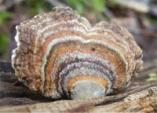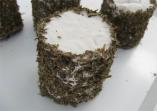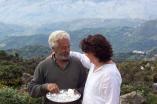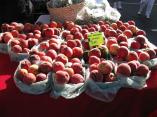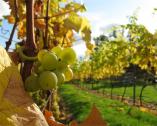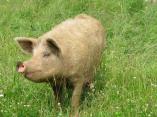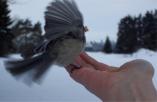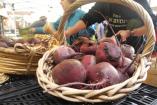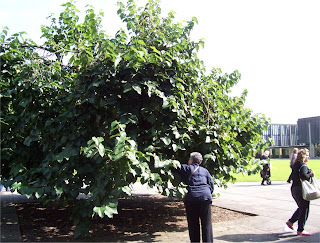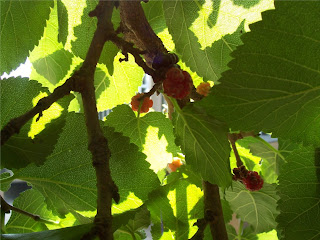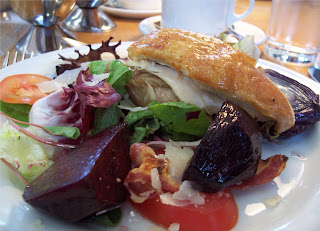(**This post was lurking in my unposted half-finished back-(b)log and pertains to two previous posts from September 2007: apologies if it reaches and confuses current subscribers!)
We went round the mulberry tree on Sunday.
I don’t believe I’d ever eaten a mulberry, let alone picked one off a tree. I was surprised. They seemed very fragile, perishable nuggets, difficult to get hold of at the perfect moment of ripeness. Once ripe, these ones at least seemed to be already mouldy. Past their harvest date or inherently flawed? Further research clearly indicated..
The Sunday morning sessions were really interesting. I started with the panel on Foie Gras, poppies and cacao.
The Foie Gras Fracas: Sumptuary Law as Animal Welfare? presented by Cathy K. Kaufman, discussed the ethics of foie gras (duck) production as practised in New York state. Her starting premise was that “killing animals for food is morally acceptable provided that animals not suffer unnecessarily in their rearing or slaughtering”.
The argument she presented was more or less the same as I’d heard from a former chef. She observed that migratory birds have an inbuilt behaviour to store fats for the journey, and to do this practice a form of gluttony that is compatible with being fed the volume of grain that producers provide them; and that the force-feeding of birds, gavage, has been practiced for millenia: it appears on Egyptian tomb-paintings reckoned to date back to 2500 BCE. She also observed that tube-feeding is not a world away from the regurgitation/throat feeding practiced by parent birds on their young (i.e. although we would not want a tube down our throats, it’s not so different from having your mom’s beak pushed down there). The birds Kaufman was writing about were visited by veterinarians who found them generally less stressed and in better living conditions than factory-farmed fowl, as I guess you’d expect when they are raised in smaller numbers. Jeffrey Steingarten has a good piece on the same theme.
In Poppy: Potent yet Frail – Aylin Öney Tan gave the Turkish history of poppy production and the impact of foreign interference in local agricultures. She dated opium poppy cultivation back to Mesopotamia in 4000 BC. Her comments on the physical similarity between poppy seed heads and pomegranates were a revelation, as she showed a few illustrations that could be seen quite differently if you mentally swapped plants. She talked about the culinary uses of poppy seeds: in breads and baking, in both savoury and sweet dishes, and as a cooking oil, which contains no opiates. The oil is also used by artists and the paint industry because of its unique drying qualities. She pointed out that it’s a plant used in its entirety by peasant farmers, including the use of poppy seed pulp (left over from oil pressing) as animal feed (now that would make for happy animals..?). Although poppy production resumed in 1974, after being banned due to international pressure, the legal hoops that villagers have to go through limit the numbers of those willing to cultivate it.
Cacao in Brazil or the History of a Crime by Marcia Zoladz was a bit of a tangled web, covering an example of market manipulation in the late eighties and early nineties. Basically it was the story of a group that was aiming to change the economic and political power balance in Brazil by buying up cacao plantations and then destroying them by infesting them with a fungus known as witches’ broom (Crinipellis perniciosa). The infected plantations would then infect healthy ones and cripple the whole economy. Cacao was always an export crop, so there are question marks about its value in a healthy and self-sustaining economy. Brazil’s complicated social history – where slavery was abolished but replaced by a kind of indentured labour system – was part of the problem, and the reason for the act, as well.
Sunday lunch was organic chicken: local, seasonal foods, very good and extremely beautiful.
A further postscript: The papers presented at the 2007 “Food and Morality” themed Oxford Symposium are now available from Prospect Books.
